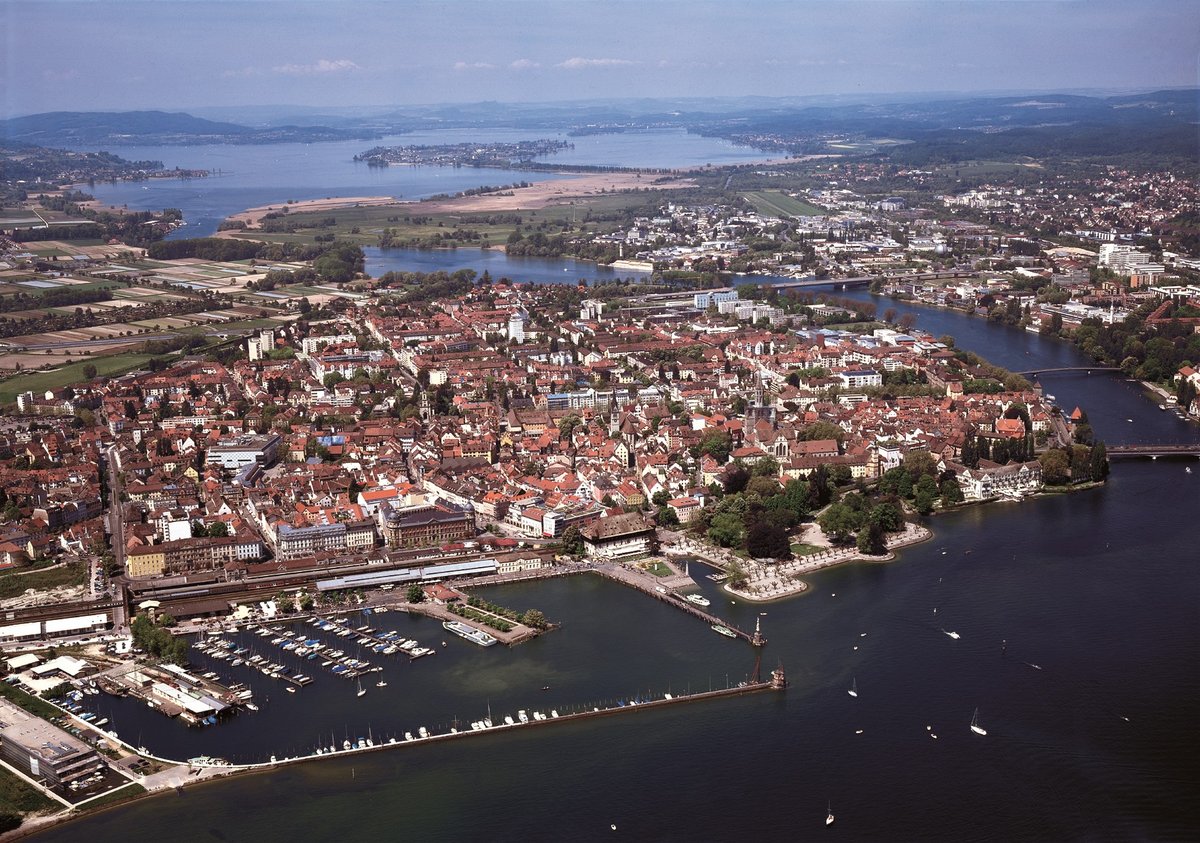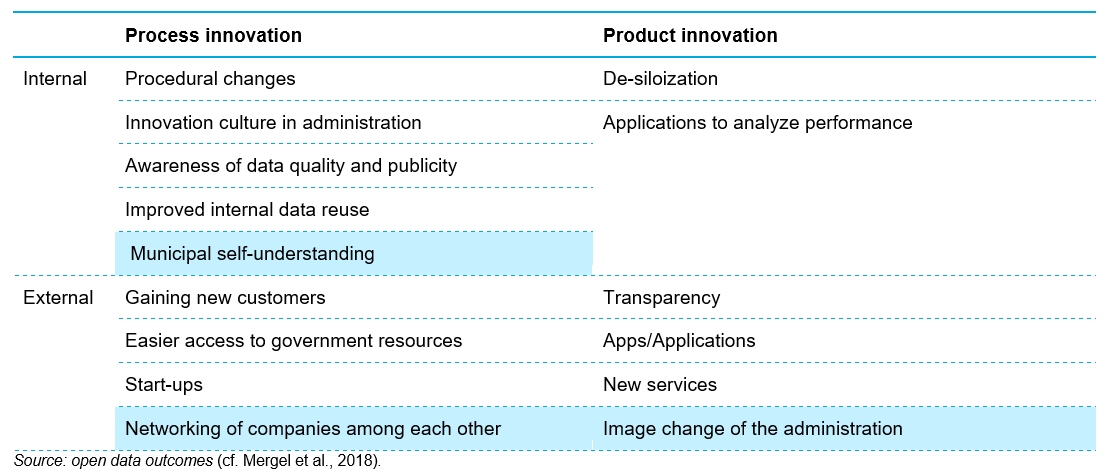
Open data outcomes: Expectations for an open data portal for the City of Konstanz
Clara Goerlich
Abstract
Despite the social and political relevance as well as significant sums of money invested by the public sector in open data initiatives, there are only a few systematic studies on the value that can be generated by providing open data for citizens and the public administration. Open data outcomes refer to effects or results that can be triggered by opening access to the data. The work presented here is the first to analyze a German city in this respect. The aim is to identify and categorize expectations for open data outcomes for the City of Konstanz. Drivers and barriers in the implementation process of the open data platform will also be identified to investigate what can contribute to the successful implementation of an effective open data portal.
Context
In the digital age, data as a resource plays an essential role for our society and touches many components of life today. Shared use of this inexhaustible resource can mean added value for politics, science, industry and citizens.
Open data refers to the concept of making data freely available to the public to use, disseminate and process. This includes data collected by civil servants and often 'hoarded' by the authorities. This refers in particular to data of general interest covering public or social aspects. Including, for example, geographic, traffic, weather, household data and official statistics. Generally, personal data are excluded from publication, i.e. data that is subject to data protection for security reasons.
It is believed that giving access to data can lead to enormous economic added value and promote democratic elements such as transparency and civic participation (vgl. Attard, Orlandi, Scerri, & Auer, 2015).
Public sector transparency is often seen as one major achievement of open data initiatives. In this paper, however, it is assumed that (1) open data added value goes beyond increased transparency, and (2) open data can drive various innovations outside and within the administrative apparatus.
Theoretical framework
The article "Open data outcomes: U.S. cities between product and process innovation" by Mergel, Kleibrink and Sörvik (2018) provides the theoretical framework for the research presented. The study examines US-American cities with regard to open data outcomes and develops a schema for conceptualizing outcomes with different dimensions. An important dimension is the distinction between outcomes within and outside the public administration. In addition, there is the distinction between process and product innovations. These developed categories are applied in the following to the case of Konstanz.
Method
The research process was divided into two steps: The first step was an analysis of the formal project assignment for the open data portal in Konstanz, embedded in state and federal legislation. Subsequently, own data was collected with the help of semi-structured interviews.
The City of Konstanz is one of the first medium-sized cities in Germany to set up an open data platform and is the individual case study to be investigated.
Thirteen stakeholders from Konstanz relevant to open data were interviewed. To this end, external actors were intentionally also selected in addition to employees from various departments of the city administration. The data collected was evaluated according to Saldaña’s (2016) qualitative data analysis method.
Results
1. Expectations of open data outcomes
The scheme for the operationalization of various open data outcomes according to Mergel et al. (2018) can be applied to the expected outcomes for the open data portal of the City of Konstanz, supplemented by individual aspects for Konstanz (compare fields marked blue in the diagram below). The aspects mentioned by the interviewees are discussed along the categories: Process and product innovations & presented outside and inside the administration.

Process innovations
Process innovations are new or significantly improved ways of providing services (e.g. changes in internal processes). Overall, the interviewees showed more expectations of process-centered rather than product-centered outcomes, with process innovations being mentioned more frequently within the administration.
Within the administration
Most respondents see open data outcome potential in internal procedural changes within the administration. Better cross-departmental cooperation allows established processes to be revisited and to be optimized gaining efficiency and effectiveness. In addition, a culture of innovation can emerge which includes different aspects, such as a new openness of the organization leading to more cooperation with external actors in new formats (e.g. hackathons or citizen dialogues), a more tolerant culture of error or a newly gained “municipal self-image”. The interviewees also expect a growing awareness of data quality and publicity and improved internal data reuse.
Outside administration
The acquisition of new customers and thus the strengthening of Konstanz as a business location, easier access to government recourses, start-ups and networking of companies among each other are the process outcomes expected outside the administration.
Product innovations
Product innovations are new or significantly improved products or services (e.g. apps that link different data sets). Product-centric outcomes are more often located externally than internally.
Within the administration
The interviewees expect that administration-typical thinking in silo structures can be broken up and that open data can serve as an application to analyze performance.
Outside administration
Transparency is the main aspect that was associated with product outcomes. In addition, possible new apps or applications, new services and an image change of the administration were mentioned. Administrative action can be better understood by citizens through open data and could thus lead to greater understanding, acceptance and an improved image of the administration.
2. Drivers and barriers in the implementation process of the open data platform
Drivers
The drivers named by the interviewees are mainly the following persons (groups) and institutions: City administration, economy, politics, citizens and universities.
Barriers
In the implementation of the open data portal, mainly institutional barriers are seen, in addition difficulties regarding complexity, legislation, use and participation and quality of information are mentioned. Technical difficulties are explicitly excluded by some respondents, while others do see problems here.
Theoretical & practical implications
In summary, the study for Konstanz makes it clear that outcome potentials are primarily seen in internal administrative process changes. Expectations, especially regarding external outcomes, remain essentially vague. It becomes clear that individual actors of the administration play an active role in the process of introducing the portal. At the same time, doubts are expressed as to whether cultural change and the opening of the administration will ultimately take place on a larger scale. The chance to achieve innovations and "public benefit" through open data is more likely to be achieved through long-term cultural change in the administration with ongoing process changes than through the creation of a portal due to political pressure to act (cf. Mergel, Kleibrink, & Sörvik, 2018).
Overall, the interviewees showed great interest and willingness to implement open data concepts effectively. Many of the preconditions mentioned in the literature for a successful implementation are taken into account by the city. However, there is no defined open data strategy for Konstanz. Clear guidance and objectives, however, are crucial for concrete ideas about outcomes to emerge and for the focus later to be on those processes and products that actually bring social benefits (cf. Mergel et al., 2018; Zuiderwijk & Janssen, 2014).
In the end, three practical implications for an effective implementation of an open data platform can be derived from the interviews:
- Orientation on existing strategies and technical solutions for open data portals: This means that the City of Konstanz does not have to create its own expensive software solution. The administration remains independent of companies and can draw on experience and a proven system.
- Observe data selection and quality: Masses of information and poor data quality can discourage addressees from using them. What is needed are good technical solutions with good search functions, but in the long-term also structures that can support the use of Open Data and ensure data quality both inside the administration and outside of it.
- Involve internal and external actors of the administration: A portal only makes sense if it is continuously maintained and routinely updated with new information. Therefore, the issue should be brought closer to the administrative staff and they should be trained to manage the concern about excessive demands and to promote acceptance. It is important to involve users’ perspectives already during the implementation process and to create incentives for data use later on. The platform chosen by Konstanz focuses in particular on interaction with users.
Key points
In summary, it can be said that Open Data has a lot of potential that can lead to a variety of outcomes within and outside the administration. However, it does not automatically bring social benefits. It is an instrument that must be used consciously and purposefully.
The results and practical implications described may also be relevant for other cities regarding the effective implementation of an open data platform. As the results are pure expectations of open data outcomes in the City of Konstanz, future research on whether the expectations are fulfilled would be of great interest.

